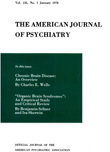Generic and trade-name antipsychotic drugs: clinical equivalence
Abstract
The clinical inequivalence of generic versus trade-name drugs has been reported for nonpsychiatric drugs but rarely for psychotropic drugs. Recent expiration of patents on some psychotropic drugs has made the evaluation of the clinical equivalence of generic versus trade-name drugs a matter of interest from methodological, sociopolitical, and economic aspects. The authors discuss these points, with emphasis on methodology, in their report of a double-blind study of the efficacy of chlorpromazine and Thorazine in the treatment of 54 acute schizophrenic patients. An analysis designed to infer the maximum possible advantage of Thorazine over generic chlorpromazine indicated that differences between the two were clinically insignificant.
Access content
To read the fulltext, please use one of the options below to sign in or purchase access.- Personal login
- Institutional Login
- Sign in via OpenAthens
- Register for access
-
Please login/register if you wish to pair your device and check access availability.
Not a subscriber?
PsychiatryOnline subscription options offer access to the DSM-5 library, books, journals, CME, and patient resources. This all-in-one virtual library provides psychiatrists and mental health professionals with key resources for diagnosis, treatment, research, and professional development.
Need more help? PsychiatryOnline Customer Service may be reached by emailing [email protected] or by calling 800-368-5777 (in the U.S.) or 703-907-7322 (outside the U.S.).



